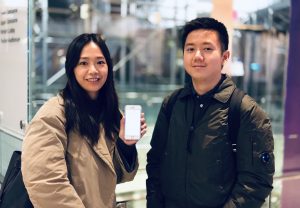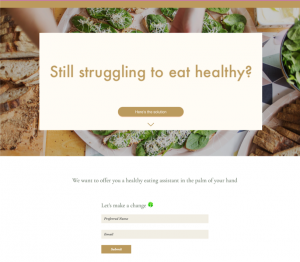This semester, students in the NYU Courant Masters of Science in Computing, Entrepreneurship, and Innovation program are taking their ideas from concept to company through NYU’s Lean LaunchPad course! As part of this course, students are introduced to the customer discovery process, where they meet and speak with potential customers outside of the NYU ecosystem to refine and validate their ideas. Meet the teams, and learn about their amazing ventures, by reading this 2-part series!
Wardrop
Do-yeon Kong, Sakada Lim
When we first started talking about business ideas, we had no clue how to build a company: we just had an idea. Fortunately, the first class in this one year program, Design and Innovation, was immensely helpful in developing our concept. We knew we wanted to work on a fashion startup, and through this class, we studied this industry extensively and explored options through which we could affect the market. Our tiny cohort of eight people has allowed us to have one-on-one coaching by the professors/mentors, and we’ve talked at length every week to refine our plan.
After we settled on an idea, it was put to the test in the second semester through the Lean Launchpad class. This program has a hands-on approach where we have to get out of the classroom and conduct customer interviews every week to validate hypotheses for our startup. It followed the philosophy of failing fast so that we do not waste time on something that no one wants. And this was how our journey started.
Our initial idea was to build a clothing recommendation engine to sell clothes online. By creating a style profile of every individual customer, we hoped to cut down the time they spent browsing for clothes online when they shop by only showing the items that fit their profile. We jumped into technical development and building systems without figuring out who our ideal target customers were. What was the result? No one seemed to be interested in our initial model. It was not a smooth start in the beginning, but we learned a lot and put together all the feedback to find a way to bounce back.
After a series of interviews, we narrowed down our customer segment and validated many of our assumptions. Through the conversations, we learned that people like to kill time by looking at clothes online and get inspired. However, when they do shop online, they will shop from brands with which they have experience. We also admitted that our initial platform was not attractive to customers, since we did not provide much value to them. Learning this quickly and early on in the process allowed us to pivot to a new idea that solves another need of our customers learned through the same interviews. The truth was that there were a lot of insights in the customer discovery process and that was the critical part of this Lean Launchpad class – to go out into the world and validate our ideas, or to fail fast.
Starting a business for the first time, even if you had a solid understanding of management or development skills, can be challenging. It was, however, an essential opportunity for us to establish a mindset of hypothesis testing, which is a key to failing fast.
HealDiet
Xin Tong, Omer Katz
Our team is trying to create a better solution for helping people develop healthy eating behavior. Everyone wants to eat healthily, but this isn’t always an easy task. People are trying different methods, but having trouble committing. That’s why we aim to provide a way to help people build long-term healthy eating behavior step-by-step.
Through the Lean LaunchPad course, we’ve learned a lot about creating a startup. We came in with our initial ideas and hypotheses, and then began to conduct customer interviews to validate them. This is the most important part of building a startup: we learned that we had to get out of the building and talk with people to understand their behavior and see from their perspectives. It’s easy to come up with different new ideas, but it’s necessary to figure out if there is really such a problem among people and if our idea really improves the lives of our customers. Talking with different people gave us valuable insights and helped us pivot in a better direction.
In addition to customer interviews, we’re using the business model canvas to think about our company in a structured way, including validating our value propositions, customer segments, and so on.
We also present our learnings and progress every class, which is a good exercise for us. Speaking out about what we’ve learned is a great way for us to get feedback, find new problems to explore, and improve our business.
It's already more than halfway through the course, and we can see the progress we’ve made and look forward to the rest of the semester. Hopefully, we can finally figure it out and create a solution to help people find healthy diets.









